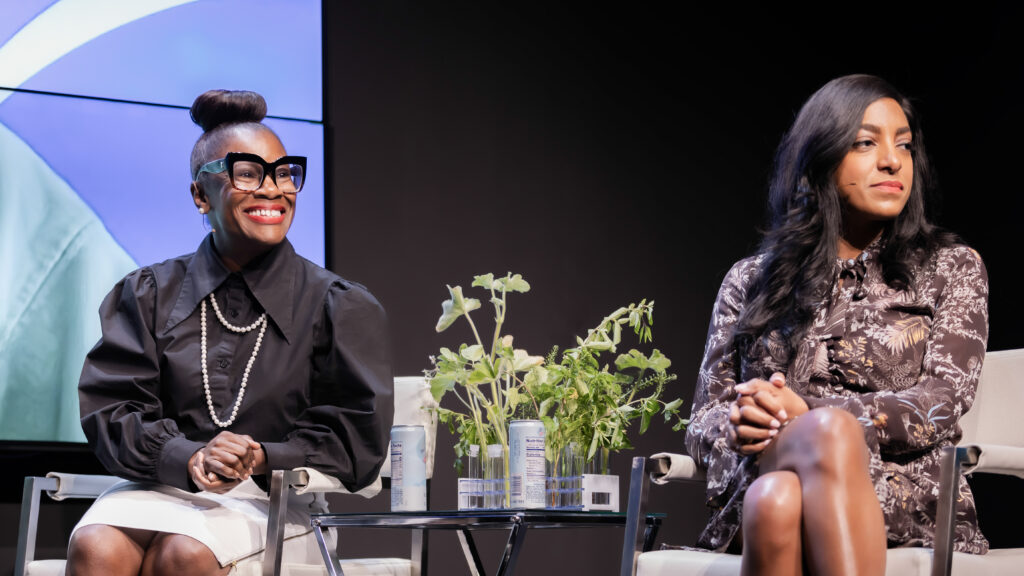
When Black people receive maternal care, they are often not treated the same as white people. In 2016, when Simmone Taitt had her first pregnancy loss, she was very well insured, had a high-paying job as a tech executive, and had access to one of the top OB-GYNs in New York City. Yet, when she found out that her baby had no heartbeat, she left that appointment with no medical follow-up, and no emotional or mental health support.
“And I did what 85% of all Americans do. I went to Dr. Google and there is where I found things, very simple things that weren’t offered to me,” said Taitt, the founder and CEO of Poppy Seed Health, on Thursday at the STAT Breakthrough Summit West in San Francisco. Taitt eventually quit her job, became a doula, and started Poppy Seed Health to deliver on-demand emotional and mental health support for birthing people.
“You see three Black women here today, and I can tell you that it’s our lived experiences that sent us into the realm of starting and building a solution to solve something very personal for us, but also for generations in front of us,” said Taitt, about the work she and two other health tech entrepreneurs are spearheading to address the national crisis in Black maternal health. Black women are dying at nearly three to four times the rate of white women during pregnancy and childbirth. Furthermore, mental-health-related conditions also contribute to maternal mortality, with 20% of those deaths attributable to suicide. “So when people ask me, I’m building it selfishly for me, but also for everyone that’s suffering in silence.”
Melissa Hanna, co-founder and CEO of Mahmee, a platform to support wraparound prenatal and postpartum care, emphasized the need to address systemic racism and bias in health care.
STAT
Hanna saw gaps in wraparound care, which is provided from conception through a baby’s first birthday, through her work in technology and health care and is able to address them by focusing on patient support and care provided by doulas, nutrition coaches, and registered nurses certified in obstetrics.
Kimberly Seals Allers created Irth for Black birthing people to address the lack of information about OB-GYNs, hospitals, and pediatricians that cater to their needs. Specifically, the app crowdsources reviews from people on providers and hospitals to generate experience data.
Allers created the app after feeling disrespected and traumatized while giving birth to her first child, despite going to one of the best hospitals in her area. At the time, she was an unmarried graduate student at Columbia, and she said she was treated like an unwed Black woman with basic insurance. “And so what I really would have needed to see was reviews from people like me,” Allers told STAT’s national science correspondent Usha Lee McFarling. Irth is positioned as a Yelp for health care providers and facilities.
“It is our digital Green Book for safe Black birth. We know that my parents and my grandparents literally needed tools for where they could travel safely. And so now we’ve created our digital Green Book for birth, and we’re excited about its promise,” Allers said.
But despite their successes, these women faced challenges as Black women entrepreneurs in health care technology. Taitt noted she was the 88th Black woman in the U.S. in 2020 to raise over $1 million for her company. “That’s abysmal,” she said. Hanna recently received $9 million in funding from big names like Serena Williams, Mark Cuban, and Goldman Sachs, but emphasized that resources for maternal health do not need to be backed by just venture capitalists.
Allers added that one of the biggest barriers to adopting these products has to do with how Black mothers do not feel valued. “There’s a terrible narrative in Black maternal health, that you should be lucky to be alive and your baby’s alive. And so when they have these traumatic experiences, but yet they are alive, they’re like, ‘I just want to move on,”’ she said. “We’re really proud to create the message to our community that in Irth your story matters but that is something they have not heard.”

